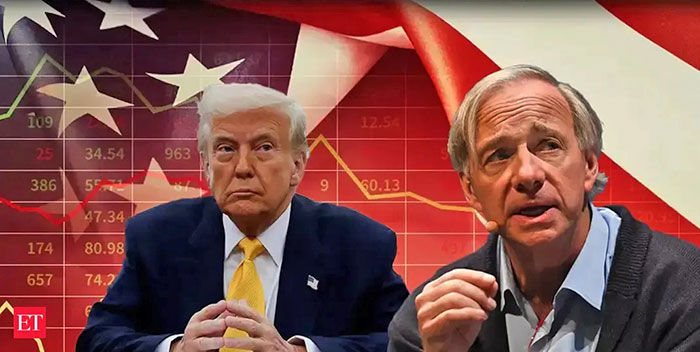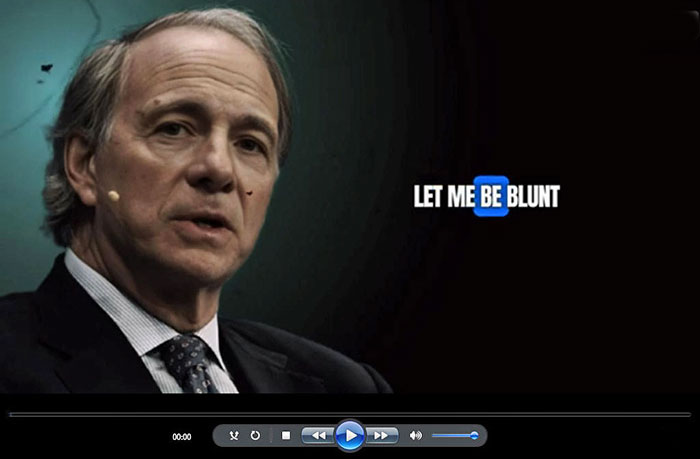|

by Ray Dalio
Founder, CIO Mentor, and Member of the Bridgewater
Board
April 07, 2025
from
Linkedin Website
Information sent by MJGdeA

At this moment, a huge amount of attention is being justifiably paid
to the announced tariffs and their very big impacts on markets and
economies while very little attention is being paid to,
the
circumstances that caused them and the biggest disruptions that are
likely still ahead...
Don't get me wrong, while these tariff
announcements are very important developments and we all know that
President
Trump caused them,
most people are losing sight of
the underlying circumstances that got him elected president and
brought these tariffs about.
They are also mostly overlooking the vastly
more
important forces that are driving just about everything, including
the tariffs.
The far bigger, far more important thing to keep in mind is that we
are seeing a classic breakdown of the major monetary, political, and
geopolitical orders...
This sort of breakdown occurs only about once in
a lifetime, but they have happened many times in history when
similar unsustainable conditions were in place.
More specifically:
-
The monetary/economic order is breaking
down because there is too much existing debt, the rates of
adding to it are too fast, and existing capital markets and
economies are supported by this unsustainably large debt.
The debt is unsustainable because the of
the large imbalance between,
-
debtor-borrowers who owe too much
debt and are taking on too much debt because they
are hooked on debt to finance their excesses (e.g.,
the United States)
-
lender-creditors (like
China) who
already hold too much of the debt and are hooked on
selling their goods to the borrower-debtors (like
the United States) to sustain their economies.
There are big pressures for these
imbalances to be corrected one way or another and doing so
will change the monetary order in major ways.
For example,
This is a result of these parties being
in a type of war in which self-sufficiency is of paramount
importance.
Anyone who has
studied history knows that
such risks under such circumstances have repeatedly led to
the same sorts of problems we're seeing now.
So,
-
the old monetary/economic order in
which countries like China manufacture inexpensively,
sell to Americans, and acquire American debt assets, and
Americans borrow money from countries like China to make
those purchases and build up huge debt liabilities,
...will have
to change.
These obviously unsustainable
circumstances are made even more so by the fact that they
have led to American manufacturing deteriorating, which both
hollows out middle class jobs in the U.S. and requires
America to import needed items from a country that it is
increasingly seeing as an enemy.
In an era of deglobalization, these big
trade and capital imbalances, which reflect trade and
capital interconnectedness, will have to shrink one way or
another.
Also, it should be obvious that the U.S.
government debt level and the rate at which the government
debt is being added to is unsustainable.
(You can find my analysis of this in my
new book
How Countries Go Broke - The Big Cycle.)
Clearly, the monetary order will have to
change in big disruptive ways to reduce all these imbalances
and excesses, and we are in the early part of the process of
it changing.
There are huge capital market
implications to this that have huge economic implications,
which I will delve into at another time.
-
The domestic political order is breaking
down due to huge gaps in people's education levels,
opportunity levels, productivity levels, income and wealth
levels, and values - and because of the ineffectiveness of
the existing political order to fix things.
These conditions are manifest in
win-at-all-cost fights between populists of the right and
populists of the left over which side will have the power
and control to run things.
This is leading to democracies breaking
down because democracies require compromise and adherence to
the rule of law, and history has shown that both break down
at times like those we are now in.
History also shows that strong autocratic
leaders emerge as classic democracy and classic rule of law
are removed as barriers to autocratic leadership.
Obviously, the current unstable political
situation will be affected by the other four forces I'm
referring to here, e.g., problems in the stock market and
economy will likely create political and geopolitical
problems.
-
The international geopolitical world
order is breaking down because the era of one dominant power
(the U.S.) that dictates the order that other countries
follow is over.
The multilateral, cooperative world order
the U.S. led is being replaced by a unilateral, power-rules
approach. In this new order, the U.S. is still largest power
in the world and is shifting to a unilateral, "America
first" approach.
We are now seeing that manifest in the
U.S. led trade-war, geopolitical war, technology war, and,
in some cases, military wars.
-
Acts of nature (droughts, floods and
pandemics) are increasingly disruptive.
-
Amazing changes in technology such as AI
will be highly impactful to all aspects of life, including
the money/debt/economic order, the political order, the
international order (by affecting interactions between
countries economically and militarily), and the costs of
acts of nature.
Changes in these forces and how they are
affecting each other is what we should be focusing on.
For that reason, I urge you to not to let news-grabbing dramatic
changes like the tariffs draw your attention away from these five
big forces and their interrelationships, which are the real drivers
of Overall Big Cycles changes.
If you allow yourself to be distracted by them,
you will,
-
miss how the conditions and the dynamics
of these big forces are causing these news-making changes
-
fail to think through how these
news-making changes will affect these big forces
-
fail to keep focused on how this Overall
Big Cycle and the parts that drive it typically transpire,
which will tell you a lot about what is likely to happen.
I also urge you to think about the
interrelationships that are critically important.
For example, think about how Donald Trump's
actions on tariffs will affect,
-
the
monetary/market, economy order (it
will be disruptive to it)
-
the domestic political order (it will
likely be disruptive to it as it will probably undermine his
support)
-
the international geopolitical order (it
will be disruptive to it in many obvious ways that are
financial, economic, political, and geopolitical)
-
climate (it will somewhat undermine the
world's ability to deal with the 'climate change' issue
effectively...)
-
technology development (it will be
disruptive in some positive ways to the U.S., like bringing
more technology production into the U.S., and in some
harmful ways, like being disruptive to the capital markets
that are needed to support technology development and in too
many other ways to innumerate here.)
As you do this, it's helpful to keep in mind that
what is happening now is just a contemporary version of what has
happened innumerable times throughout history.
I urge you to study the actions that policy
makers took in analogous past cases in which they found
themselves in similar positions to help you build a list of things
that they might do - things like suspending debt service payments to
"enemy" countries, establishing capital controls to prevent the free
flow of capital out of the country, and imposing special taxes.
Many of these things would've been unimaginable
not long ago, so we should also study how these policies work.
The breakdowns in the,
monetary, political, and geopolitical orders
that take the forms of depressions, civil wars, and world wars,
that then lead to the new monetary, political orders that govern
interactions within countries, and the geopolitical orders that
govern interactions between countries until they break down,
...have all happened repeatedly and are
the most important things to understand well.
I described them in detail in my book
Principles for Dealing with the Changing World
Order so you can see it clearly laid out there.
The Overall Big Cycle is described in six
clearly identifiable stages that unfold as one order becomes the
next.
It is laid out in such detail that it is easy
to compare what is now happening with what typically happens, so
it is possible to identify what stage the cycle is in and what
is likely to come next.
When I wrote that book and my other books, I
hoped, as I still do, that I would be able,
-
to help policy makers understand these
forces and interact with them to produce better policies so
we get better results
-
to help individuals who can collectively
but not individually affect policies to deal with these
forces well so they could get better results for themselves
and those they care about
-
to encourage smart people who have
different views than mine to have open, thoughtful exchanges
with me so that we can all try to get at what is true and
what to do about it.
References
Video

Video also
HERE...
|
While tariffs
and their market impacts dominate headlines, the deeper,
more critical issue is the breakdown of the global
monetary, political, and geopolitical order - a rare,
once-in-a-lifetime shift driven by unsustainable debt,
inequality, and deglobalization.
Key forces at play:
-
Monetary/Economic Order Collapse: Unsustainable debt
imbalances (e.g., U.S. overborrowing, China
over-lending) are forcing a restructuring of global
trade and capital flows.
-
Domestic
Political Fragmentation: Rising inequality and
populism are eroding democracies, paving the way for
autocratic leadership.
|
|



